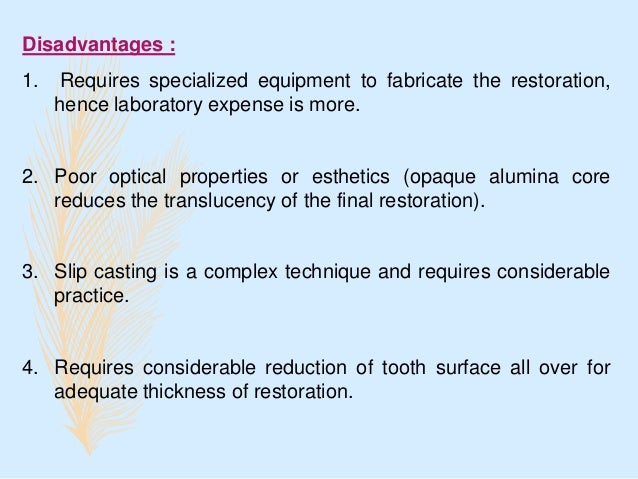Less durable all ceramic crowns can also last for many years but they re less durable as compared to other types of dental crowns.
Disadvantages of dental ceramics.
To overcome the disadvantages of dental porcelain three types of dental ceramics have been developed.
All ceramic crowns require craftsmanship on the part of the dentist to match your other teeth and affix the custom fit piece of dental work.
Metal ceramics porcelain fused to metal or pfm combine the positive mechanical properties of cast dental alloys and excellent esthetic property of porcelain.
Placing an all ceramic crown may offer some advantages in regard to biocompatibility.
Ceramic dishes are leak proof and are ideal for hot teas and other hot and cold beverages.
Feldspathic ceramics also are used for veneers that are bonded directly to tooth structure particularly in the upper anterior region.
With quality comes cost.
The types of ceramics used to make them are typically no more abrasive than dental enamel itself gold crowns have this advantage too in comparison the type of porcelain used to make pfm crowns can be very abrasive to opposing teeth and dental restorations and cause significant wear of.
A few disadvantages of all ceramic crowns.
Today these ceramics remain among the most esthetic of the dental ceramics and are primarily used as veneers over alloys or high strength ceramic substructures that impart strength.
Please use one of the following formats to cite this article in your essay paper or report.
It is well worth it but for some the cost is a deal breaker.
Here are the disadvantages you should know.
While there are several benefits of getting an all ceramic dental crown it s only fair to also highlight its disadvantages.
While the former has been popularly applied as artificial dental roots for recovering the function of lost teeth the latter are increasingly used for regenerating bone tissue.
Advantages and disadvantages of dental crowns.
The choice of metals is a key element in pfm.
Ceramics are especially useful in areas with heavy moisture such as bathrooms kitchens and outdoors.
Introduction ceramic is defined as product made from non metallic material by firing at a high temperature.
Bioactive ceramics are used as bulk porous bodies or surface active layers on dental implants and as morphogenetically active scaffolds inserted into the jawbone.

